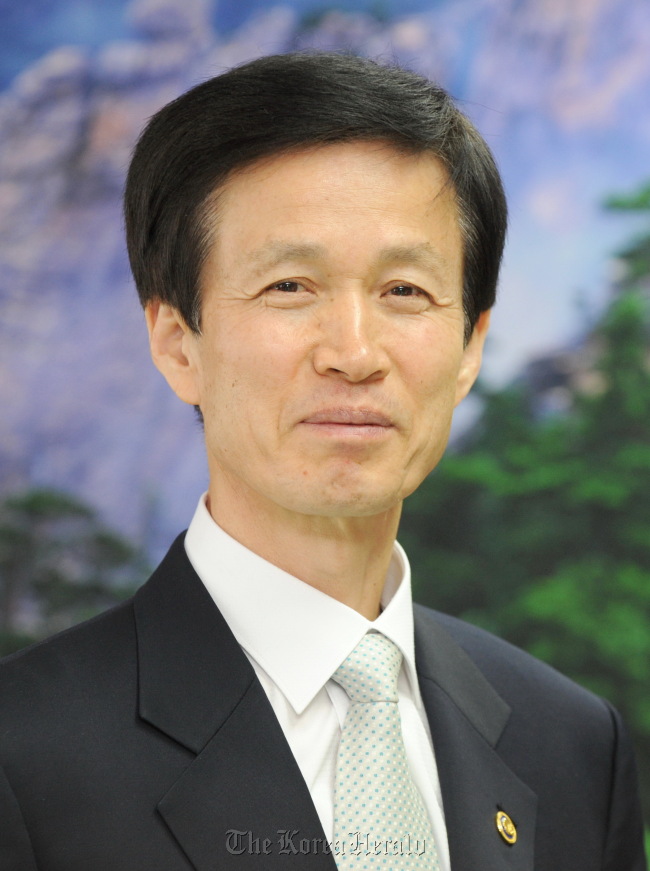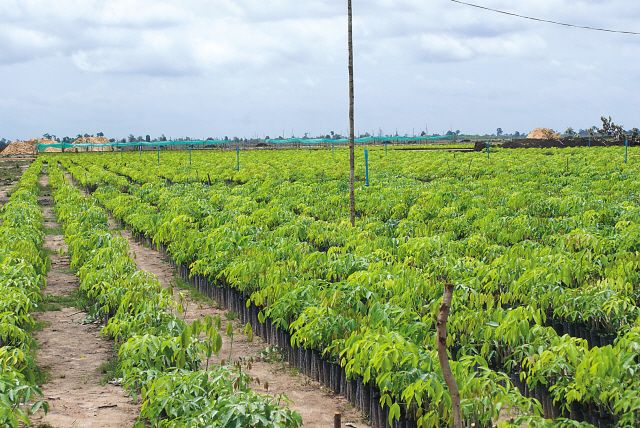Korea works green growth with Asia to improve forests
By Korea HeraldPublished : Aug. 6, 2012 - 19:51
Korea Forest Service seeks to expand forest cooperation regionwide
The Asian Forest Cooperation Organization, or AFoCO will be established after three years of preparation through an agreement between the governments of the member states of the Association of Southeast Asian Nations and Korea on forest cooperation.
Through it, Seoul will attempt to actively strengthen international forest affairs among Asian countries through climate change mitigation and forest cooperation projects. It also plans to disseminate the nation’s “Low Carbon Green Growth” platform to Asian countries.
During an Independence Day ceremony in 2008, President Lee Myung-bak proposed a new growth paradigm that balanced economic development and environmental protection, running counter to the conventional perspective that environmental activities hampered economic development.
Korea’s green growth plans made progress at the ASEAN-Korea Commemorative Summit in June 2009, when Lee presented the proposal for an international organization that would mitigate the effects of climate change. Korea and the ASEAN member states signed the Agreement on Forest Cooperation in November 2011. The agreement entered into force on Aug. 5, allowing the establishment of AFoCO.
Rehabilitation
The agreement entered into force on Aug. 5, 2012, about a month before AFoCO is to launch. Besides the procedures for the establishment of the organization, the agreement mainly focuses on the reinforcement of the roles of Korea and ASEAN in the forest sector in order to deal with climate change.
The agreement covers the rehabilitation of degraded land and forest biodiversity, and prevention of forest disasters, sustainable forest management and conservation, and capacity-building, technology-transfer, and research and development related to forests.
Korea rehabilitated degraded land through three national forest plans between 1973 and 1997. They planted more than 10 billion trees and converted more than 65 percent of Korean territory into forests. This was possible because of efficient policy implementation coupled with strong participation by local communities.
From 1962 to 2010, 4.23 million hectares of artificial forest were created and 10.8 billion trees were planted. This successful afforestation supported by local communities has facilitated forest rehabilitation in developing countries. Susilo Bambang Yudhoyono, the president of Indonesia, even complimented the success of forest rehabilitation in Korea during the country’s Arbor Day ceremony and stressed that Indonesia should learn from Korea’s experience.
The Asian Forest Cooperation Organization, or AFoCO will be established after three years of preparation through an agreement between the governments of the member states of the Association of Southeast Asian Nations and Korea on forest cooperation.
Through it, Seoul will attempt to actively strengthen international forest affairs among Asian countries through climate change mitigation and forest cooperation projects. It also plans to disseminate the nation’s “Low Carbon Green Growth” platform to Asian countries.
During an Independence Day ceremony in 2008, President Lee Myung-bak proposed a new growth paradigm that balanced economic development and environmental protection, running counter to the conventional perspective that environmental activities hampered economic development.
Korea’s green growth plans made progress at the ASEAN-Korea Commemorative Summit in June 2009, when Lee presented the proposal for an international organization that would mitigate the effects of climate change. Korea and the ASEAN member states signed the Agreement on Forest Cooperation in November 2011. The agreement entered into force on Aug. 5, allowing the establishment of AFoCO.
Rehabilitation
The agreement entered into force on Aug. 5, 2012, about a month before AFoCO is to launch. Besides the procedures for the establishment of the organization, the agreement mainly focuses on the reinforcement of the roles of Korea and ASEAN in the forest sector in order to deal with climate change.
The agreement covers the rehabilitation of degraded land and forest biodiversity, and prevention of forest disasters, sustainable forest management and conservation, and capacity-building, technology-transfer, and research and development related to forests.
Korea rehabilitated degraded land through three national forest plans between 1973 and 1997. They planted more than 10 billion trees and converted more than 65 percent of Korean territory into forests. This was possible because of efficient policy implementation coupled with strong participation by local communities.
From 1962 to 2010, 4.23 million hectares of artificial forest were created and 10.8 billion trees were planted. This successful afforestation supported by local communities has facilitated forest rehabilitation in developing countries. Susilo Bambang Yudhoyono, the president of Indonesia, even complimented the success of forest rehabilitation in Korea during the country’s Arbor Day ceremony and stressed that Indonesia should learn from Korea’s experience.

Lee Don-koo, the minister in charge of the Korea Forest Service, pointed out that Korea had transformed from an aid-recipient country into an aid-donor country in just 60 years. He asserted that Korea was the only country that developed from degraded lands into a green country by “achieving both economic development and forest rehabilitation.”
On the other hand, the Food and Agriculture Organization of the United Nations and the United Nations Environment Program called Korea’s forest rehabilitation one of the world’s prides and emphasized that Korea’s developed rehabilitation model should be disseminated.
Initiatives
Since the 2009 summit, Korea has held several high-level dialogues and meetings with ASEAN’s 10 member states in order to finalize the draft of “the Agreement of the Establishment of the Korea-ASEAN Forest Cooperation Organization.”
After the agreement on AFoCO’s establishment at the 23rd meeting of the ASEAN Senior Officials on Forestry held in January 2010 in the Philippines, there were five meetings of the Ad-Hoc Working Group. The agreement was finally signed by the ministers of foreign affairs of Korea and ASEAN member states at the ASEAN-Korea Summit on Nov. 18, 2011.
AFoCO is designed to bridge developed countries and developing countries, rather than being a simple forest cooperation organization. Korea looks forward to increasing cooperation with Asian countries to prevent deforestation and desertification in Asia.
Moreover, the agreement plays a fundamental role in invigorating international relations among Asian countries at a time when climate change, biodiversity, poverty and other global issues has brought home the importance of forests.
KFS Minister Lee affirmed, “The agreement is meaningful as a concrete outcome of ‘Low Carbon Green Growth,’ which is the initiative of the current government. The agreement will provide a platform for Korea to stimulate forest cooperation in the international arena.”
Furthermore, he believes that “with this agreement a solid ground for dialogues on all forest matters is set by having strengthened Korea’s forest international relations with forest governments in Asia.”
Operation of AFoCO
AFoCO will plan and organize projects with ASEAN member states, will incorporate staff to implement these projects and staff to execute the Agreement on Forest Cooperation, and will secure enough financial resources for its operation.
The organization plans to hold workshops on techniques and regional issues, and establish local centers to deal with local problems. As the secretariat will be established in Seoul, Korea is to fund the greatest part of the operating costs but all ASEAN member states agreed to contribute. AFoCO is to further extend cooperation to other existing international organizations and NGOs.
Facing climate change
The primary object of AFoCO is to encourage green growth by enhancing ASEAN member states’ approaches to climate change, desertification and other forest related issues through strengthened cooperation.
Experts from Korea and ASEAN will work in the AFoCO Secretariat in Seoul, and diverse forest specialists will be trained according to the needs of cooperation projects, the United Nations Collaborative Program on Reducing Emissions from Deforestation and Forest Degradation in Developing Countries, geographic information systems and remote sensing, and other things. In addition, AFoCO aims to extend its membership to more Asian countries, such as Mongolia, Nepal and Kyrgyzstan.
The total forest area in ASEAN member states, 213 million hectares, constitutes about 20 percent of the world’s forest and greatly influences society, culture and the environment both directly and indirectly. As tropical forest rehabilitation and capacity-building for R&D have been one of the main interests of ASEAN member states, Korea has supported ASEAN capacity-building since 2000 through the ASEAN-Korea Environmental Cooperation Project. This is expected to invigorate the training of tropical forest specialists.
On the other hand, the Korea Forest Service has promoted bilateral forest cooperation with six countries since 1987 and has been active in many parts of the world such as Russia, New Zealand, Brazil, Paraguay and Tunisia. It has also signed bilateral cooperation with four ASEAN member states including Indonesia. The KFS is expected to secure Carbon Emission Rights for national corporations by investing the afforestation of 20 hectares in Cambodia and 70 hectares in Indonesia. Moreover, the KFS is now in the process of implementing four pilot projects and nine forest cooperation projects with a budget of $1 million.

Existing forest cooperation projects include afforestation and rehabilitation, and cover diverse spheres such as biodiversity, eco-tourism, non-timber forest products, renewable bioenergy and capacity-building. The latter is expected to grow further with the inclusion of human resources development with education programs. Capacity-building for Korea such as supporting Korean scientists’ research in foreign countries is also available.
By Lee Kwon-hyung (kwonh@heraldcorp.com)
-
Articles by Korea Herald



![[Exclusive] Korean military set to ban iPhones over 'security' concerns](http://res.heraldm.com/phpwas/restmb_idxmake.php?idx=644&simg=/content/image/2024/04/23/20240423050599_0.jpg&u=20240423183955)




![[Pressure points] Leggings in public: Fashion statement or social faux pas?](http://res.heraldm.com/phpwas/restmb_idxmake.php?idx=644&simg=/content/image/2024/04/23/20240423050669_0.jpg&u=)











